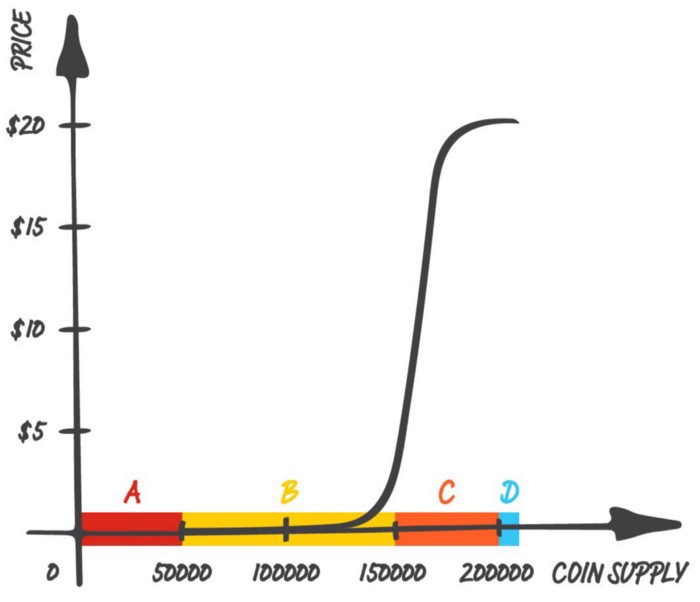Streamers have reached their final form: cryptocurrency
Creator Coins are meant to help streamers make money without relying on corporate platforms.

Blockchain protocols make it possible to prove ownership of digital stuff, which has some neat applications. One company, founded by Brian Fargo, is using the tech to build a marketplace for pre-owned digital games, as an example. But it's also the buzzword behind countless "revolutionary" platforms that haven't revolutionized anything, off-shore investment schemes, Twitter scams, and far too many webinars. I'm automatically skeptical of any email that features "crypto" in the subject line, which definitely included the latest pitch: Give streamers and other creators their own cryptocurrencies.
The natural question is: Why? The group behind the platform, Rally, gave me a few answers. The main reason, in their view, is the freedom to make money outside the rules and fees of platforms like Twitch.
Creator Coins, and the point of them
The currencies are called Creator Coins, and they solve a simple problem in a complicated way. The problem is that popular Twitch streamers and other creators want a way for fans to support them financially with as few fees and restrictions as possible. The complicated solution is to create a mini-economy for each creator, minting custom digital coins in their name which are actually "subtokens" of a cryptocurrency called Rally ($RLY) on the Ethereum blockchain.
If that didn't make much sense to you, the good news is that Creator Coins are simple at the user level. You don't have to understand the Ethereum marketplace to support a creator. You just log into Rally.io with a Twitch account, enter a debit or credit card, and buy up to $1,000 worth of a streamer's coins. After that, you can donate the coins back to them, hold onto them, or trade them. It's like using Twitch Bits, except there's more you can do with them, and there's no fee aside from any necessary transaction processing fees that are collected when you buy coins, which Rally doesn't profit from.
You might also wonder why Vellanki and company are building the Creator Coins platform in the first place, if it's all going to be open source and community run. What do they get out of it? It's the same as with other cryptocurrency creators: they own a chunk of the Rally tokens that, they hope, will be valuable if the platform is popular.
"Rather than having equity in the company, we all hold the underlying token, which is going to be a Rally network token that backs all the Creator Coins," said Vellanki (we spoke before the Rally token launched). "That's our incentive to do it."
The point is to provide a way for fans to directly support creators that isn't tied to a platform like Twitch or YouTube. In part, that's to lessen fees, but Rally co-founder and head of growth Mahesh Vellanki, who I spoke to recently, also thinks creators would like to have their financial relationship with fans uncoupled from corporate platforms in case the worst happens.
"I know a lot of folks ask about Patreon, or Bits, or these other tools that creators do use for monetization," said Vellanki. "You know, those platforms are always changing the fees, they're changing the rules. It's not a matter of if but when they're going to censor folks or deplatform them, so it's kind of good until it's not. Whereas with Rally we're trying to build an open network that over time will be open sourced and decentralized such that it's governed by the community, not by a central corporation or company."
In other words, if I get banned from Twitch (possibly for a legitimate reason, though Vellanki focused on the idea of censorship) and move to YouTube, my fans can’t continue to tip me with Twitch Bits. They’ll probably just toss their stack to another streamer they like. But if they own TylerCoins, they hold onto those regardless of where I choose to stream or post videos.
The biggest gaming news, reviews and hardware deals
Keep up to date with the most important stories and the best deals, as picked by the PC Gamer team.

Social media bans (or the lack of them, sometimes) are frequently controversial. Big social media platforms like Twitch are expected to kick out streamers who violate certain norms, though what exactly those norms are is endlessly debated—and Twitch has not always made popular decisions, especially when it comes to women on the platform. (And sometimes platforms just go away: Microsoft recently gave up on Mixer and sent its partnered streamers to the swampy waters of Facebook.)
The Creator Coin norms will be decided by creators on the platform, as owning Rally tokens will entitle them to votes on which creators to bring into the platform or kick off, how to tweak the pricing algorithm, and anything else that affects the system (the voting system is still in development, and it's not a community-controlled platform yet).
Creators controlling their own monetization platform is certainly a nice thought, though who specifically owns the majority of Rally will presumably determine its character. (Could it potentially be more cliquey, or dictated by the most popular but not necessarily most magnanimous creators?)
What it means to have a creator economy
Vellanki also thinks that creators will find novel ways to use the public record of who owns their coins. Because ownership of my hypothetical TylerCoins is verifiable, I could see who my most financially invested fans are and offer them bonuses, such as Discord server access or exclusive streams. Even though fans holding onto my coins doesn't directly make me money, it's helpful for me to give my currency intrinsic value, because the more of them there are in circulation, the more actual US dollars back them.
To explain how that works, it'll be useful to start my hypothetical scenario from the beginning. Let's say I'm a big time streamer who has just been accepted to the platform. I get a new Creator Coin currency named after me, which I've already called TylerCoins. For starters, I'm given 50,000 TylerCoins to hold onto. That's a lot of coins, but they're worth almost nothing, because Rally has only backed them with a tiny amount of collateral.
While I sit on my 50,000 worthless coins, my fans start buying TylerCoins with US dollars. They aren't buying from my supply. Instead, new coins are being minted as they're purchased, so the total number of TylerCoins increases: 50,001, 50,002, 50,003. The price of each new coin is set by something called a "token bonding curve," which sets the price of TylerCoins based on how many are in circulation. The more TylerCoins that are out there, the more it costs to mint new ones, so the price goes up with popularity. The first TylerCoin sold (coin number 50,001) might cost $0.075, but the 100,000th TylerCoin might cost $0.12. The money spent on my coins goes into a collateral pool that backs all of the coins with US dollars. That means that the more TylerCoins that exist, the more value my 50,000 TylerCoins have.

I can't just cash out all 50,000 coins as if they're vouchers for US dollars, though. "[Creators] can only sell their coins as a function of how much volume is in their community," Rally co-founder and head of growth Mahesh Vellanki told me on a recent call. And as coins are sold, the number of coins in existence goes down, and so the price per coin goes down in accordance with the token bonding curve.
Where I'll make money as a creator is by accepting donations of TylerCoins, using them for transactions (20 TylerCoins for a shoutout, 50 TylerCoins to choose what I play next, etc), and converting them to USD or another cryptocurrency a bit at a time.
Rally has a more detailed breakdown of the system on its blog.
Wagering coins, and other possibilities
Is this a better way to tip a streamer? Twitch, YouTube, Patreon, PayPal, ko-fi, and other content and payment services do the job currently, and there are downsides: fees, and as Vellanki mentioned, and the possibility of being banned. But built-in tipping and subscribing systems have the advantage of being visible on the platforms themselves, easy and well-established, and unburdened by long FAQs about "token bonding curves."
One thing that might help Creator Coins, in my opinion, is that they can easily be traded among fans, or between fans and creators. That is, I could gift TylerCoins to my fans, and they could gift them back to me—or we could trade them, or wager them. One Creator Coin creator, Gen.G Esports general manager Stanz, lets stream viewers put up StanzCoins to challenge him to games. They double their coins if they win.
"The winner must exhibit skill in the game to succeed," said a Rally representative when I asked about Stanz's "thunderdomes," and whether certain uses of Creator Coins might run up against gambling laws. "This is active community building in the form of friendly skill-based contests entered into between a streamer and his fan base."
Of course, you could imagine other games played with Creator Coins—other ways to wager them or speculate on their value—that might blur lines. Even if these mini-economies won't behave like typical markets (given that coin prices are set by an algorithm), it seems to me that the biggest draw of Creator Coins will be the perceived potentialities of buying currency. Twitch Bits are just a thing you can give to a streamer. But it's possible to have more of one creator's Creator Coins than anyone else—even if just to brag about it—and perhaps to wager and win them, and even to make a small profit on them, as the streamers aren't the only ones who'll be able to sell off their coins.
Creator Coins may not be a stock market, but they still assign a dollar amount to a streamer's popularity and their ability to create value with their offers. I could see that having an effect on fanbases that already judge success and failure on Twitch viewer counts and Steam concurrents.
Giving streamers a self-managed, open source way to make money that isn't tied to any one platform or corporation might be all Rally needs to do to be valuable. But if Creator Coins do take off (unlike so many blockchain brethren who promise big things and then peter out), I suspect that it'll be because of things like Stanz's contests. That's what sets them apart from the other ways streamers seek financial support from fans.

Tyler grew up in Silicon Valley during the '80s and '90s, playing games like Zork and Arkanoid on early PCs. He was later captivated by Myst, SimCity, Civilization, Command & Conquer, all the shooters they call "boomer shooters" now, and PS1 classic Bushido Blade (that's right: he had Bleem!). Tyler joined PC Gamer in 2011, and today he's focused on the site's news coverage. His hobbies include amateur boxing and adding to his 1,200-plus hours in Rocket League.

